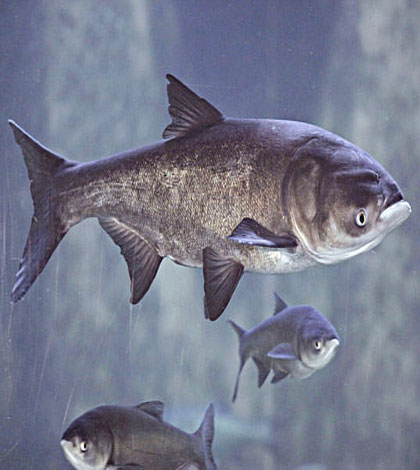TORONTO—The chair of the newly formed Georgian Bay Great Lakes Foundation is appalled that nothing is being done by U.S. government agencies on grass carp that have been found in the Sandusky River (Ohio) and are now reproducing, with concerns that if these carp or any other are found in the Great Lakes they would have a serious effect on wetlands and fishing populations.
“On the day of an Asian carp forum (held October 3 in Toronto, Ontario) I learned that grass carp are reproducing on the Sandusky River that drains into Lake Erie, in Ohio,” Mary Muter told the Recorder Tuesday. “I’m appalled that nothing is being done about it right now.”
“I was told that the Ohio DNR (Department of Natural Resources) is looking at coming up with a plan to deal with this in 2017,” stated Ms. Muter.
Earlier this year, Holly Embke, a graduate student at the University of Toledo, collected eight grass carp eggs in the Sandusky River, a tributary of Lake Erie. Ms. Embke’s discovery was the first to confirm a reproductively viable population of grass carp in the Great Lakes.
“I spoke to representatives from the Ontario Ministry of Natural Resources and Forestry, Department of Fisheries and Oceans on the Canada-Ontario side and similar U.S. departments in attendance,” said Ms. Muter. “I attended the Asian Carp Committee of the Great Lakes Fishery Commission public meeting in Toronto. They admitted there is a reproducing grass carp population in the Sandusky River not far from Lake Erie. There are some U.S. states that allow grass carp to be in ponds for ‘weed control.’ And so now they have established in the Sandusky River and said they have a plan in two years to go in and remove them.”
Ms. Muter questioned the forum representatives on learning that there is a reproducing grass carp population in the Sandusky River. “The Ohio DNR plans to deal with it in two years. Let’s get in the Sandusky now and put an action plan in place to remove these invasive fish. Grass carp will rip apart most of the remaining Great Lakes coastal wetlands.”
She suggested that Canada and Ontario could help to get electro-fishing boats out and get rid of the grass carp.
“DFO and OMNRF could be there in two weeks,” said Ms. Muter. “The Sandusky River is very polluted, so they could use the same fish poisons as was used several years ago in the Chicago Sanitary Canal. This is a serious threat. Whatever measures it takes to get rid of them we have to have in place and get on with it now not in two years. We don’t want grass carp in Georgian Bay or anywhere in the Great Lakes,” she stated, noting there are farms in the US and Ohio that grow and sell grass carp to be put in ponds around Ohio to control algae, but the sale and transport of these carp and other types of carp should be banned everywhere. “Ontario and Canada prohibits the sale or transport of any live carp and any Asian carp brought into Canada must be eviscerated and have the heads cut off. The US needs the same rules and we call on partners and crews to get out there now, not in 2017.”
“I also wonder where the Asian Carp Regional Coordination Committee is on implementing their primary objective, use aggressive measures for all contingency actions,” said Ms. Muter. (The Asian Carp Regional Coordination Committee consists of 27 US and Canadian federal, state, provincial and regional agencies and was formed in 2010 to prevent the introduction, establishment and spread of Asian carp into the Great Lakes.) “I told them the Canada government agency Fisheries and Oceans and the OMNRF could be on hand in two weeks to get rid of the grass carp, if they were invited to help out.”
“This is too important to wait,” said Ms. Muter. “I asked the committee, why isn’t action being taken now instead of waiting to 2017? Let’s take action now to make sure these carp don’t get into the Great Lakes.”
“Some US experts have been saying all along that these grass carp can’t reproduce, but obviously they can,” said Ms. Muter “I’m so tired of the US Army Corps of Engineers saying that they can put in another electric barrier at Chicago to keep them out. They have just spent $60 million to build yet another electric barrier. Why not spend that on separating the waterways. Chicago just needs to ramp up their efforts to put in place much better sewage treatment and send their storm water out to Lake Michigan where it belongs. Let’s take action now to make sure they don’t get into the Great Lakes.”





